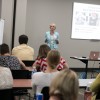
Cynthia Germanotta had just buckled into a trans-Atlantic flight back from Paris when her daughter paused and looked at her.
Mom, it’s time, she said.
The 25-year-old singer, Lady Gaga, had just finished another international concert. She had just finished listening to yet more stories from young fans struggling with bullying and mental health issues. And she knew she had to do something about it.
Germanotta shared that inspiration behind the Born This Way Foundation during the June 13 Bullying Prevention Conference at the University of Nebraska–Lincoln. The conference drew more than 150 early childhood educators, teachers, adminstrators, parents and researchers.
“We wanted to empower (young people) to really lead healthy, fulfilling and productive lives,” said Germanotta, co-founder and president of the Born This Way Foundation, which aims to support the wellness of young people. “And, stated as simply as possible, we wanted to make the world a kinder and a braver place.”
Germanotta joined keynote speakers Dan Olweus, international bullying prevention scholar, and Marjorie Kostelnik, UNL’s acting senior vice chancellor of academic affairs, in discussing the latest in bullying prevention research and intervention.
There is hardly anything more important than helping children figure out how to get along… Prevention and intervention must start early.
Marjorie Kostelnik
The public conference opened with remarks from Olweus, who shared insight from his career on bullying prevention research and results from his bullying prevention program, which has been implemented in more than 7,000 U.S. schools.
Olweus described a major shift in how bullying issues are viewed. At the start of his career, these issues were often considered a natural part of school life, he said.
“Now to see that (bullying) has become a very pressing public health and social issue, which must be addressed, is very rewarding,” Olweus said.
The conference also featured an emphasis on bullying behaviors in early childhood. UNL’s Marjorie Kostelnik discussed ways to identify and address these behaviors, often categorized as hostile, accidental or instrumental—such as two children fighting over a toy.
To address children’s hostile behavior, Kostelnik discouraged conference participants from ignoring it, responding with aggression or using inconsistent approaches. Instead, she shared research-based strategies to minimize children’s frustration, coach children and help them interpret social cues, point out positive efforts, and engage onlookers, among other suggestions.
“There is hardly anything more important than helping children figure out how to get along,” Kostelnik said. “Infants and toddlers can develop skills to be less inclined to engage in hostile aggression. Prevention and intervention must start early.”
Four workshop sessions provided additional opportunities to explore topics on children’s temperament, black boys’ socio-emotional development, social-learning curricula and the evolving landscape of play.
The conference was sponsored by the Buffett Early Childhood Institute, the College of Education and Human Sciences, and the Nebraska Center for Research on Children, Youth, Families and Schools. It is the sixth annual conference hosted by the Bullying Research Network, which is co-directed by Susan Swearer, professor of educational psychology.
View keynote speaker video presentations
Photo gallery:









